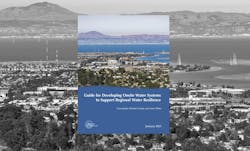New guide for planning, designing, and operating onsite water reuse systems
The Pacific Institute, a global nonpartisan water think tank, has released guidance for developers to plan, design, and operate onsite water reuse systems.
The Guide for Developing Onsite Water Systems to Support Regional Water Resilience “advances circular, localized approaches to managing water that reduce a site’s water footprint, improve its resilience to water shortage or other disruptions, and provide benefits for local communities and regional water systems,” according to a news release. Onsite water systems collect and treat water from onsite sources, including wastewater, rainwater, and stormwater, and reuse it for non-potable water uses like toilet flushing, outdoor irrigation, and cooling, which can account for over 75% of a site’s water demand.
The new guide helps site developers envision and evaluate how an onsite system can use a multi-benefit approach to build water resilience, support equity, improve environmental health, and protect public health. Each section includes sample questions to consider, ways for stakeholders to engage, highlights resources to examine, and offers recommended analyses. The guide also provides a range of case studies illustrating best practices and lessons learned.
“Onsite water systems are gaining traction across the U.S. and the world as a water resilience strategy,” said Heather Cooley, director of research at the Pacific Institute. “This circular approach can provide multiple benefits for the building, water systems, and the larger community. In addition to diversifying water supplies, they can reduce pollution from stormwater, create green space, and provide added flexibility and redundancy to centralized water systems.”
